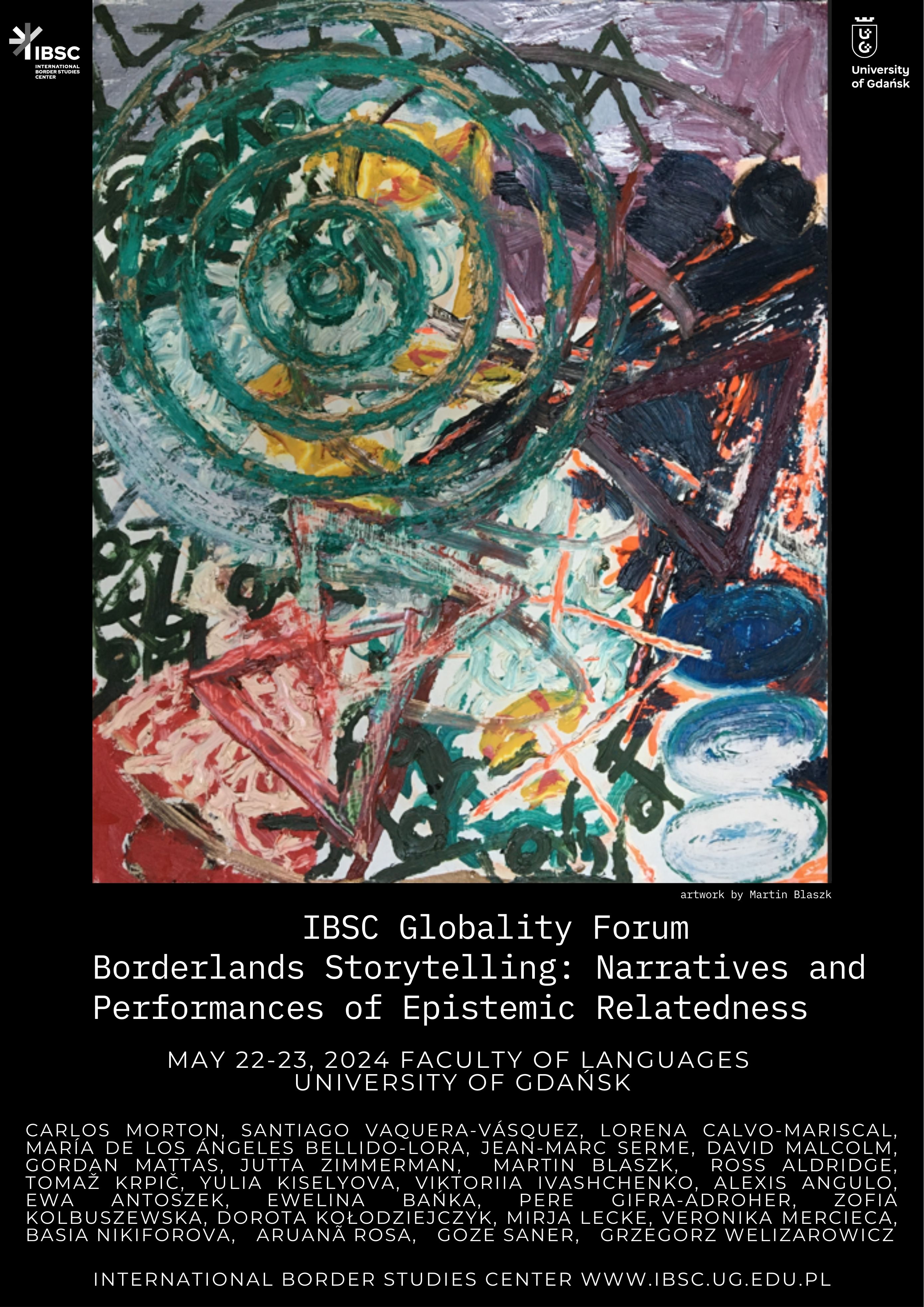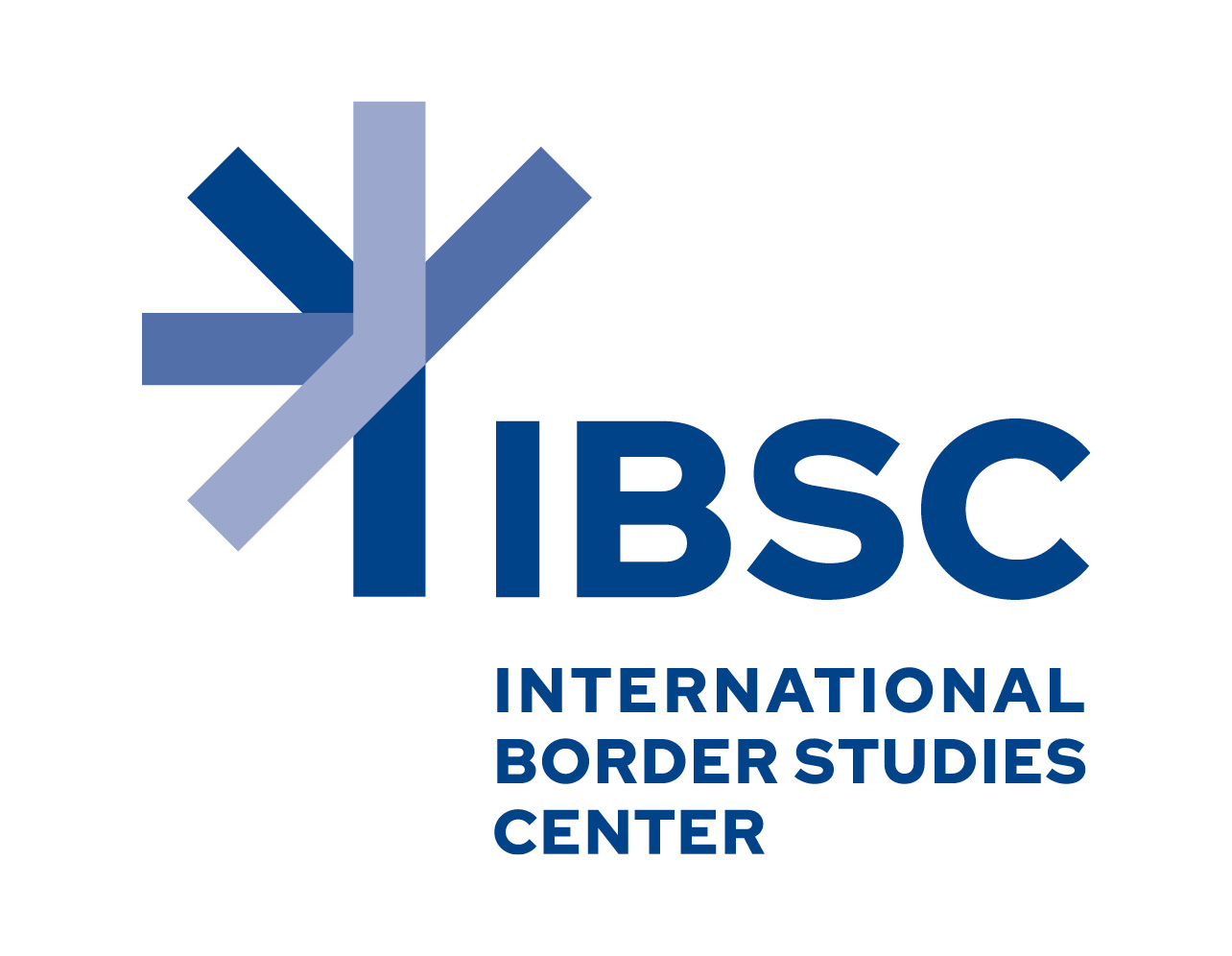
International Border Studies Center presents:
Globality Forum
Borderlands Storytelling: Narratives and Performances of Epistemic Relatedness
May 21-23, 2024, Room 355, Faculty of Languages, University of Gdańsk
Sessions on Wed and Thurs held in room 355, floor 3, Neophilology Building
Globality Forum program (pasted below, and via link to printable version): https://docs.google.com/document/d/1SHY4UwrdZ6jvsoMsI5CoOO1sAW4HxnR9/edit#heading=h.qqxuwk3ascfd
FOR INFORMATION ON THE 21ST MELAMMU WORKSHOP HELD IN CONJUNCTION WITH THE GLOBALITY FORUM PLEASE GO TO: EVENTS – CALLS&INVITES: https://ibsc.ug.edu.pl/events/event-info/
|
Time slot |
Tuesday, May 21, 2024 |
Wednesday, May 22, 2024 ROOM 355 |
Thursday, May 23, 2024 ROOM 355 |
|
9:30-11:00 |
Session 1 – Keynotes Join Zoom Meeting https://uw-edu-pl.zoom.us/j/95686312540 Grzegorz Welizarowicz – Welcome address, Mission Critical Studies: Report from the Field Carlos Morton – PLAYING CATHOLIC: How Religion Seeps into My Work David Malcolm – “Let Them Call It. . . .”: Colonial and Post-Colonial Confusions in Short Stories by Rudyard Kipling, Seán O’Faoláin, and Jean Rhys |
Session 5 – Graduate Session Join Zoom Meeting https://uw-edu-pl.zoom.us/j/92302557128 Veronika Mercieca Maltese Women’s Transnational Experiences in the 1950s through Maritime Journeys María De Los Ángeles Bellido-Lora Safeguarding Human Life at Sea: A Comprehensive Study on Maritime Borders and the Imperative of Human Rights-Based Migration Control Alexis Angulo Towards epistemological justice. Enrique Dussel and the analectic method Aruanã Rosa Xenoracism, borders, and the Other in Europe: reflections for decolonization |
|
|
11:00-11:20 |
Coffee break |
Coffee break |
|
|
11:30-13:00 |
Session 2 – Literatures Join Zoom Meeting https://uw-edu-pl.zoom.us/j/92284912602 Jutta Zimmermann Multi-Narratives: The Narrative Construction of Globality Gordan Mattas Borderlands in the Novels of Amy Tan Pere Gifra-Adroher The American Frontier in Catalan Literature: The Case of J. M. Folch i Torres |
Session 6 – American Borderlands and Indigeneity Join Zoom Meeting https://uw-edu-pl.zoom.us/j/97896903713 Ewelina Bańka Margo Tamez’s Dissident Stories of Indigenous Rivered Existence at the Texas-Mexico Border Dorota Kołodziejczyk “When a body was more than a body and possible. One of its possibilities was to hold a river within it. The archive as embodied relatedness of being in Native American poetry. Jean-Marc Serme Away from the `āina: Borderlands of identity, territory and cultural practices among the Kanaka/Native Hawaiian diaspora |
|
|
13:00-14:00 |
Lunch on your own |
Lunch on your own |
|
|
14:00-15:30 |
GÖZE SANER Workshop from 2PM to 4PM |
Session 3 – Creative Pedagogy Lab Join Zoom Meeting https://uw-edu-pl.zoom.us/j/91570460868 Santiago Vaquera-Vasquez –Pensamiento Fronterizo: Pedagogical Reflections |
Session 7 – Theater, Film, Television, Performance Join Zoom Meeting https://uw-edu-pl.zoom.us/j/97436867218 Zofia Kolbuszewska The (Neo)Baroque Enfolding of a Crime Timescape in the Norwegian TV Series Beforeigners Mirja Lecke Border Thinking in Białowieża: Agnieszka Holland’s “Zielona granica” (2023) Tomaž Krpič Breaking and Fixing Cognitive Boundaries: On Artistic Labour in Theatre and Performance |
|
15:30-15:45 |
Coffee break |
Coffee break |
|
|
15:45-17:15 |
GÖZE SANER Seminar 4:45PM to 5:15PM |
Session 4 – Migrations and Representations Join Zoom Meeting https://uw-edu-pl.zoom.us/j/98643856607 Basia Nikiforova At the Crossroads of Personal and Global Perception: the Case of Sigita Maslauskaitė-Mažylienė (ONLINE) Yulia Kiselyova and Viktoriia Ivashchenko Temporalities of Migrant Narratives: Evidence from the Oral History Project „Moving West: Ukrainian Academics in Conditions of Forced Migration (2014–2024) Ewa Antoszek Counternarratives: Border Artivism as a Counternarrative in Border Discourse(s) Discussion – Day 1 wrap up |
Session 8 – SUMMING UP Join Zoom Meeting https://uw-edu-pl.zoom.us/j/91060260412 Lorena Calvo-Mariscal Education and Training on Migration and Human Rights through European Teaching and Research Projects. The University of Cadiz and the Public International Law team’s experience Martin Blaszk Recourse to performance. Can individual performance add to an understanding of migration?
grant proposals team building Discussion |
